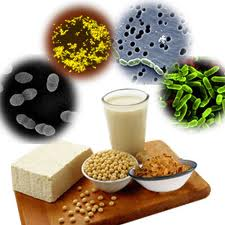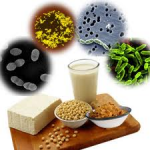Tip #1: Cover the Basics
Basic 1: Chew, Chew, Chew
- Take smaller bites.
- Put your fork down in between bites.
- Try using chopsticks – it forces you to slow down.
- Thoroughly chew each bite of food.
- Carbohydrate digestion begins in the mouth – chewing grains thoroughly allows amylase, the digestive enzyme present in saliva, to digest the grains.
Basic 2: Get Enough Water
 Insufficient water intakes is a primary cause of constipation. Constipation then causes an imbalance in bacteria, promotes inflammation of the intestinal lining, and can even lead to the absorption of larger molecules, a condition known as intestinal permeability.
Insufficient water intakes is a primary cause of constipation. Constipation then causes an imbalance in bacteria, promotes inflammation of the intestinal lining, and can even lead to the absorption of larger molecules, a condition known as intestinal permeability.
Basic 3: Increase Your Dietary Fiber
Good sources of dietary fiber include:
- Dried fruit, such as dates, figs, and prunes. Because the sugar concentrates in dried fruits, they remain healthy foods for digestive aid only in small portions. The USDA recommends 1 oz. limits.
- Beans and legumes- if you don’t have time to cook dried beans, buy canned, but make sure you rinse them thoroughly before cooking. Lentils and split peas are less gas-forming than other legumes.
- Bring an apple with you to work as a snack.
- Ground flaxseeds are a gentle laxative. They can be useful for chronic constipation, damage to the intestine wall from laxative use, irritable bowel, and to soothe inflammation. Sprinkle ground flaxseeds on rice, grains, salads, or any other meal of your choice.
- Get a daily dose of fiber to aid your digestive system from ready-to-eat whole-grain cereals. Wheat bran cereals have the highest amounts, according to the USDA Nutrient Database, with 9 g of fiber or more per suggested serving. These healthy foods contain minimal fat and maximum amounts of iron and calcium, providing 100 percent of the total daily value, in some cases. A healthy colon will fully absorb these nutrients and the high amounts of folate, vitamin B12 and other B vitamins present in many cereal varieties.
- Certain herbs are also extremely beneficial for digestion. They can aid the movement of muscles that push food along the intestine, as well as increase the production of digestive fluids and saliva.
One of the best digestive herbs is ginger. It’s an ancient herbal remedy that’s been long used in Chinese medicine, and Ayurvedic medicine. Modern day scientists have also given their approval for use of ginger to treat gastrointestinal problems and stimulate digestion.
Fennel is another excellent herb for digestion. This scientific study proved that fennel significantly increases the secretion of bile acids, which stimulates digestion. Peppermint is also known to support the digestive tract and the flow of natural digestive juices and bile, and helps stop spasms of the muscles of the digestive tract.
Tip #2: Practice Mindful Eating
 A pilot study at Indiana State University found that mindfulness, including specific instructions to slowly savor the flavor of food and be aware of how much food is enough, helped to reduce eating binges from an average of four binges per week to one and a half.
A pilot study at Indiana State University found that mindfulness, including specific instructions to slowly savor the flavor of food and be aware of how much food is enough, helped to reduce eating binges from an average of four binges per week to one and a half.
- Eat in the moment. Savor every bite, enjoying the flavors, textures, and smells of your meal.
- Buy fresh flowers to put on the dining table.
- Use smaller cutlery so that you eat less with each bite.
- Create a beautiful atmosphere – dim the lights, play music and light candles.
Tip #3: Address Food Sensitivities and Allergies
Food sensitivities are behind many digestive disorders. For example, between 33% and 66% of IBS patients report having one or more food intolerances, resulting in bloating, gas, and pain. The most common culprits are milk and dairy (40-44%) and grains (40-60%).
A trained practitioner can supervise an elimination diet. Many foods are removed from the diet for a brief period of time, then re-introduced sequentially to isolate the body’s reaction to the offending foods.
Tip #4: Increase Good Gut Bacteria
Not all bacteria are bad. There are over 400 different kinds of bacteria and yeasts in the digestive system. Of these, the bacteria Lactobacillus acidophillus and Bifidobacterium bifidum are considered good “probiotic” bacteria because they can help to maintain intestinal health.
Although good bacteria can be found in some yogurt, there is a wide variation in the quantity and quality. Look for good quality organic yogurt that adds the active cultures after pasteurization, because this heat process destroys both good and bad bacteria.
Supplements containing acidophilus and bifidobacteria can be found in health food stores. They are especially helpful for the following conditions:
- Irritable bowel syndrome
- Diarrhea
- Gas, bloating, flatulence
- Recurring vaginal yeast infections
- Bad breath
Tip #5: Supplement to Restore Digestive Health
- Enteric-Coated Peppermint Oil – Peppermint oil can reduce abdominal pain, bloating, and gas.
- Digestive Enzymes – These are often prescribed by a doctor when a patient has been discovered to be deficient in one or more types of digestive enzyme. Enzyme supplements are believed to support the body’s own digestive enzymes to aid digestion and help with other disorders stemming from poor digestion.

